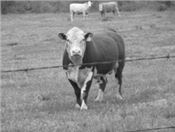|
Register Early For Fall Bull Soundness Clinics At Five Different Locations
MT. VERNON, MO.
October is a good time to prepare your bulls for the upcoming breeding season. That also makes this the best time of year to schedule a bull breeding soundness exam (BSE) as an insurance policy for the fall 2018 calf crop.
“Just because you tested your bull or bulls earlier in the spring it is not a given they’ll be in breeding shape when turned out with 30 or 40 females on Thanksgiving afternoon,” said Eldon Cole, livestock specialist with University of Missouri Extension.
Cow-calf raisers are shortening their breeding seasons from 90 days or more down to 75 or even 45 days to make their calves more uniform. Uniform calves usually bring more than those from a strung-out calf crop.
A goal is to have 75 percent of your calves born in the first 20-25 days of your calving season.
“A shorter breeding season puts more of a workload on bulls,” said Cole.
Bulls that have smaller testicles and a low percent normal sperm may be good enough when they have 90-100 days to breed 15 cows, but they will be challenged to settle 35 or 40 females in 50 days.
An exam before each breeding season pays off.
“Even if you artificially inseminate, you want the cleanup bull to be ready to settle the missed cows on their next heat period so the calf crop will still be well-bunched,” said Cole.
The BSE clinic schedule this fall includes five dates at four locations.
• Oct. 4 at Barry County Vet Service, Cassville, ph. 847-2677
• Oct. 10 at Animal Clinic of Diamond, ph. 325-4136
• Oct. 16 and 17 at Dake Veterinary Clinic, Miller, ph. 452-3301
• Oct. 16-20 at El Dorado Springs Veterinary Clinic, El Dorado Springs, ph. 417-876-5805
• October 19 at Countryside Animal Clinic, Aurora, ph. 678-4011
“Call to schedule an appointment early since clinic dates tend to fill up because there is a price break during this special period,” said Cole.
In addition to the veterinary clinics, cooperators include Zoetis and University of Missouri Extension.
Besides the routine soundness exam, bulls are treated for parasites, given a booster vaccine, body condition score and checked from head to toe for problems that could impair their ability to breed several females.
For an extra amount, bulls can be checked for trichomoniasis and have blood pulled for a genomic test.
During the March 2017 BSE clinics, 92.4 percent of the bulls passed with flying colors.
“The past summer has seen cooler than normal weather in southwest Missouri along with abundant pastures and fewer fescue toxicosis symptoms in cow herds. Logically, we'd suspect we should have fewer problem bulls this fall, but it doesn’t always work that way. That’s why attention is given to the importance of a BSE a month or so before turnout,” said Cole. ∆

A bull being helped

A bull ready for the clinic
Photo credit: University of Missouri Extension
|
|